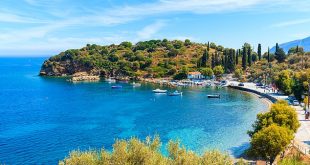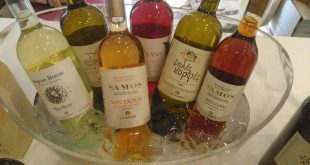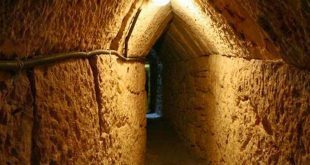The northern wine-producing villages that lie on the slopes of Abelos Mountain and reach the north coastline, are the most productive regions, out of the 26 wine producing regions of Samos, that participate in the local trade union.
Abelos Mountain, well known by this name since the 1st century AD (it is mentioned by the Greek geographer Strabo), is 1.140 meters high. Its northern slopes are literally made by the villagers themselves. Ancient terraces, built to hold the precious soil in place, form successive “terraces” or narrow strip of land that, in some cases, can accompany just a single row of vines.
In Vourliotes, Manolates, Abelos, Stavrinides, and in Platanos village, facing the north and the south coastline, muscat grape still remains a monoculture and is the economic backbone of locals. In the coastal village of Kokkari, as well as in the village of Agios Konstantinos, wine production was been considerably reduced due to the rapid growth of tourism in recent years. So the only villages of Samos, which remained “loyal” to vine monoculture, and the hard labor work a mountain vineyard requires, are the mountain villages of Abelos Mountain.
“Samos”, a “naturally sweet wine” (“Vin Naturellement Doux”), is an Appellation of Origin Controlled, sun-dried, naturally sweet wine, traded under the label “Nectar”. “Nectar” is produced from ripe muscat, exclusively selected, grapes. After harvest these grapes are sun-dried (dehydrated), thus, the sugar content in them increases to approximately 500 grams per liter. Out of the natural fermentation of its juices, comes “Nectar”, a sweet wine with high alcohol volume, without the addition of extra alcohol.
This, sun-dried, sweet by nature wine, is intensely aromatic for two reasons: (a) It sustains the flavor of the muscat grape and (b) During its very careful and delicate alcoholic fermentation, as well as during its maturation process, additional aromatic substances are created. The softness of its taste, its aroma and the truly exceptional character of this delicious wine, have made many people “loyal fans” of “Nectar”, especially among those who know how to enjoy every sip of this “golden” beverage.
The sweet Samian wine, labeled “Samos Doux” (“Vin de Liqueur”), is an Appellation of Origin Controlled wine. It is produced by ripe muscat grapes flavoring a high degree of sweetness. “Samos Doux” contains at least 221 grams of sugar per liter. During the vinification process, but certainly before the beginning of the alcoholic fermentation process, natural vine-made alcohol is added to the must. So “Samos Doux” sustains all the flavors of the muscat grape and, at the same time, is intensely sweet, because it retains almost all the sweetness it used to have when produced.
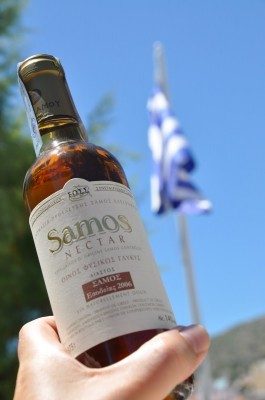 “Samos Doux” needs no recommendations at all. In few years it will celebrate a century of life, 100 years of “sweet life”. It travelled through seas and oceans, reached foreign countries, entered almost every Greek home and proved to be quite a commercial success for foreign firms that invested in “Samos Doux” and marked it in Europe, beginning from the late 19th century onwards. “Samos Doux” accompanied, quite distinctively, its so many friends in times of happiness and was, and still is, loved by four generations of consumers.
“Samos Doux” needs no recommendations at all. In few years it will celebrate a century of life, 100 years of “sweet life”. It travelled through seas and oceans, reached foreign countries, entered almost every Greek home and proved to be quite a commercial success for foreign firms that invested in “Samos Doux” and marked it in Europe, beginning from the late 19th century onwards. “Samos Doux” accompanied, quite distinctively, its so many friends in times of happiness and was, and still is, loved by four generations of consumers.
The semi-sweet Samian wine, the one wine technicians call “natural sweet wine” (“Samos Vin Doux Naturel”), is an Appellation of Origin Controlled wine. Its production is similar to that of “Samos Doux” (i.e. from must with initial sugar content of at least 238 grams per litter). However, alcohol is not added before the beginning of the alcoholic fermentation process, as it happens with the sweet wine. Instead, it is added during the alcoholic fermentation process. The added natural vine-made alcohol, added in a 5-10% proportion, inhibits the alcoholic fermentation process for a specific time period. The result is a sweet enough wine (because it still sustains much unfermented sugar), but classified as semi-sweet, because it has lost part of its initial sweetness, and as flavored wine, because it still sustains the aroma of the muscat grape.
“Samos”, a natural sweet wine from selected vineyards, is an Appellation of Origin Controlled wine (“Samos Vin Doux Naturel-Grand Cru”). It is made of ripe muscat grapes harvested by the most selected vineyards of Samos, the productivity of which does not exceed 500 kg of grapes per hectare. The must, which must have a minimum content of 252 grams of sugar per liter, is allowed to ferment until the moment when natural vine-made alcohol is added in a 5-10% proportion. As a result the fermentation process is suspended and the final product sustains its sweetness, due to the remaining unfermented sugar, and the flavor of the selected grapes from which it came from. Moreover, during its maturation and aging process, additional aromatic substances are created, which complement the overall taste of this wine. The world of wines is a pleated one, full of secrets, expertise, anxieties and pleasures shared between producers in one hand and consumers on the other hand. To them we strongly recommend our new wine: “Samos Vin Doux Naturel-Grand Cru”.
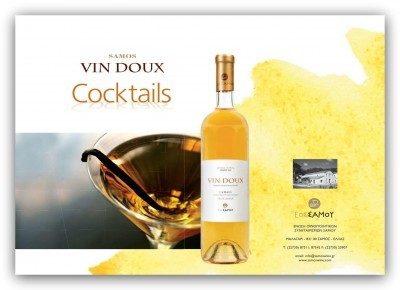 The aromatic muscat grapes are grown in the highlands of Samos, in the hanging vineyards that are stand between the blue sky and the sea, near the so-called “Eye of the God”. Muscat grapes mature slowly, but they don’t reach high degrees of sweetness. Out of these vines comes a dry white muscat, well-known and quite popular wine, which is offered under the label “Samaina”.
The aromatic muscat grapes are grown in the highlands of Samos, in the hanging vineyards that are stand between the blue sky and the sea, near the so-called “Eye of the God”. Muscat grapes mature slowly, but they don’t reach high degrees of sweetness. Out of these vines comes a dry white muscat, well-known and quite popular wine, which is offered under the label “Samaina”.
The must of these mountain grapes, which contain less than 220 grams of sugar per liter, is subject to an alcoholic fermentation process, which ends with the exhaustion of all, or at least nearly all, of its sugar. So, two types of white table wines are produced: The “Samaina Special Vin Sec” wine, which sustains a light sweet flavor, and the “Samaina Vin Sec” wine, with no sweet flavor at all.
Both “Samaina” types of wine are defined as dry muscat wines. Both maintain a very light aroma, while both are pleasant in taste and easy to drink. Those familiar with these wines can understand what we mean when we say that “the responsibility of the wine chemist does not end when the consumers drinks the wine, but the next morning, when the consumer wakes up”.
Our two rosé wines, “Fokianos” and “Ritinos” are particularly appreciated by those who have tasted them. Unfortunately, however, its supply (production) is much lower than its demand. Its cultivation has been limited into two places only (one is around the village of Kokkari and the other one is near the village of Heraion). Regretfully, its cultivation continues to shrink alarmingly, because tourism facilities and infrastructures expand rapidly in the abovementioned regions. So our two fine rosé wines are very rare, especially “Ritinos”.
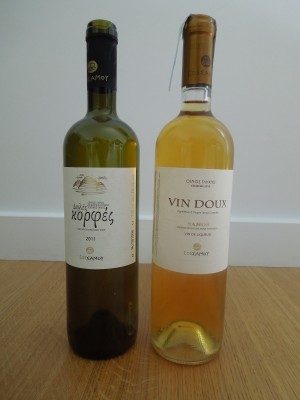 The Union of Viniculture Cooperatives of Samos (UVCS) believes that in order to produce a good wine, no matter the variety or its commercial price, favorable natural conditions and factors, as well as the care and effort of the wine producer, are not enough. A good wine, i.e. such a delicate and sensitive product, needs tradition, technique and passion alike.
The Union of Viniculture Cooperatives of Samos (UVCS) believes that in order to produce a good wine, no matter the variety or its commercial price, favorable natural conditions and factors, as well as the care and effort of the wine producer, are not enough. A good wine, i.e. such a delicate and sensitive product, needs tradition, technique and passion alike.
Wine, like music, communicates with each individual offering him or her exquisite pleasure, while keeps good company. The aroma and taste of a wine, as well as the velvety cool feeling, each sip carry within, all include a sense of measure, harmony, nature and science, all of which were basic principles in the mind and thoughts of Pythagoras of Samos. According to local tradition, Pythagoras had made a cup to drink wine in a moderate way: Inside the cup was a line, which defined the point the cup had to be filled. A single drop of wine above this line and the cup was automatically emptied through a hole at the bottom. However, Lord Byron, ignoring this simple Pythagorean practice, says, in his lyrical work “Don Juan”, that “He overflowed the cup with Samian wine”.
 iSamos.gr Η ενημερωτική σελίδα της Σάμου! Εξερευνήστε τη Σάμο, τις παραλίες της, τη φύση της, τις ομορφιές της. Διαβάστε την ιστορία της Σάμου
iSamos.gr Η ενημερωτική σελίδα της Σάμου! Εξερευνήστε τη Σάμο, τις παραλίες της, τη φύση της, τις ομορφιές της. Διαβάστε την ιστορία της Σάμου



